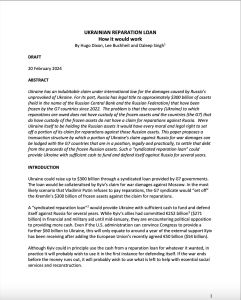
Recommendation
After Russia invaded Ukraine in 2022, the G-7 nations froze roughly $300 billion in Russian assets. According to international law, Ukraine has a right to claim reparations for war damages. Accessing these funds is problematic, however, as only Ukraine has a claim against Russia, while the G-7 are stewards of the frozen assets. In this thoughtful proposal, finance professionals Hugo Dixon, Lee C. Buchheit and Daleep Singh examine the mechanics of a “syndicated reparation loan” and its efficacy in assisting Ukraine. Readers will find this an instructive look at the role of finance in geopolitics.
Summary
About the Authors
Hugo Dixon is Commentator-at-Large for Reuters. Lee C. Buchheit is Professor (Hon.) at the University of Edinburgh Law School. Daleep Singh is a former US Deputy National Security Adviser for international economics.







Comment on this summary